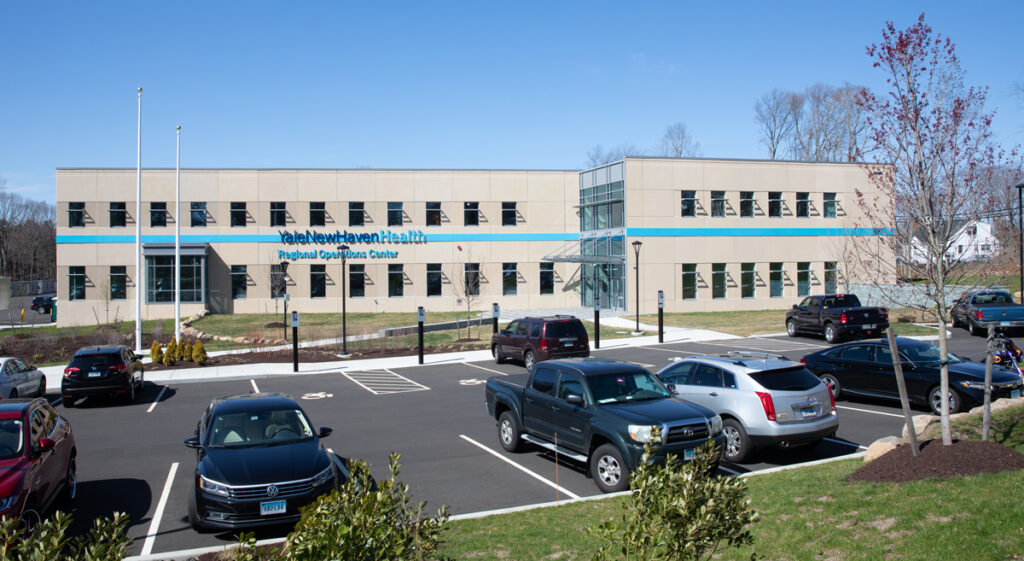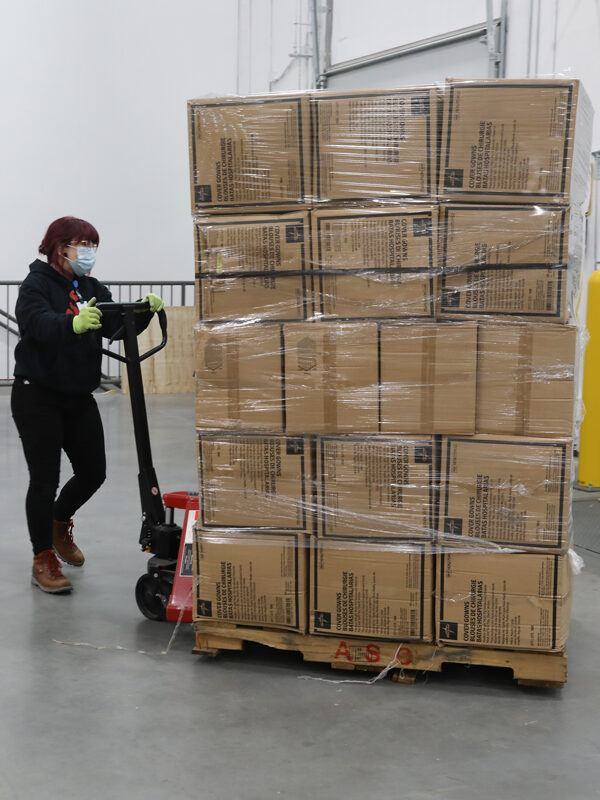From pharmacy to supply chain to clinical operations, Yale New Haven Health’s Lorraine Lee has expanded her role – and contribution – to her health system’s collective goals.
February 2022 – The Journal of Healthcare Contracting
By Graham Garrison

Lorraine Lee has always been drawn to health care. A self-described “math and science geek” in high school, she was fascinated by the inner workings of health care providers, and wanted to build her career around contributing to patient care.
Pharmacy seemed like the best fit, so Lee chose her educational path accordingly, becoming a pharmacist. “I am proud that I am a pharmacist and now have moved on to use these skills to broaden my administrative scope in a large health system.”
More than 30 years ago, Lee found a career home at Yale New Haven Health (YNHHS). She’s been with the organization ever since. “I love the organizational culture and our mission,” she said. “I work with world-renowned experts, and this is constantly stimulating and challenging. Our team members support and care for each other and that makes our difficult work doable and manageable.”
Health care is a challenging industry, Lee said, and never more so than the past couple of years, “but I have a passion for it, and it keeps me going.”
For her work across all aspects of supply chain, pharmacy and clinical operations, Lee was named The Journal of Healthcare Contracting’s Contracting Professional of the Year.
Expansion of scope
So how does an individual go from pharmacist to supply chain and beyond? As Chief Pharmacy Officer, Lee’s role was expanded to include Supply Chain in February 2018. Then in January 2021, the scope of her role was expanded again to include Laboratory and Radiology Services.
“I have always been interested in expanding my scope within health system operations to lead and bring value to other clinical services as I did for pharmacy,” she said. “I think that pharmacists have unique training and skills and are well known to be innovative problem solvers and strategic. We are trained as clinicians, but also understand how to manage operations and fiscal stewardship in a complex area like pharmacy. These are qualities that health system leadership requires to successfully navigate our industry. I rely on my background as a pharmacist to drive toward solutions that focus on safe and efficient patient care.”

As Senior Vice President for Clinical Operations, Lee has primary responsibility for Supply Chain, Pharmacy, Laboratory and Radiology Services for YNHHS. She reports to the Chief Clinical Officer for the health system, and has an experienced leader over each of her four areas.
“Together with my leaders we ensure that we have a robust strategic plan with short- and long-term goals that enable us to support the overall strategy of the health system,” she said.
The definition of clinical operations within a health system is a broad term, Lee noted, that others have termed “essential services” such as supply chain, pharmacy, lab, radiology and others as well. These are the clinical services that care for patients and are part of the health care team. “Many times, we think of nurses and physicians, but the teams that care for patients are so much more,” she said. “Some other areas include respiratory therapy, physical therapy, rehabilitation, nutrition services and more.”
One of the primary goals of her position is to ensure that her team promotes and enhances one of YNHHS’s tenets called the “Signature of Care” for all its patients throughout the health system. “No matter where or when a patient accesses the services, the care is the same. I ensure that policies, procedures and guidelines of care are harmonized in the areas I have responsibility for.”

The clinical operations leadership teams share strategic objectives to harmonize services across the health system to ensure “Signature of Care” strategies are employed, Lee said. “We review and collaborate on these to ensure we are all working toward the same collective goals. I can highlight that we have collaborated across lab, supply chain and pharmacy services to ensure we have a robust COVID vaccine and COVID testing enterprise to care for our patients and employees. These are complex and acute services that need to ebb and flow with the pandemic surges and the new guidelines that come from state and federal agencies. Our ability to work hand-in-hand on these initiatives make the complexities manageable and we have had great success.”
In the future, more collaboration across services like rehabilitation and in-home services that YNHHS can provide patients are a priority. “This again will require all the services under clinical operations to work together,” Lee emphasized.
‘The world is not the same’

Even before COVID, the way health systems operated was undergoing a tremendous amount of change. Every organization has changed over the last two decades, Lee said. “The world is not the same and we all need to move with the current times.”
Health care has never had so much innovation in technology, medication therapies and advanced knowledge through research and the quest to cure disease than in the past 20 years. Health care delivery has changed too, “we do so much more in the outpatient areas and in the home-to-care for patients,” Lee said. “This is an imperative that technology, medical supplies and medications are changing to meet these needs. It is fascinating to see how much more advanced we are today, looking forward to seeing the next two decades to continue to cure disease.”
When the first peak of the pandemic hit, it hit especially hard in New England and New York in early 2020. “We had challenges on challenges,” Lee said.
She and her team were searching for critical supplies like PPE and spent most of their energy and attention to acquire the right PPE to protect their colleagues on the front lines as they battled the pandemic. They had a brief time to recover during the summer 2020, and even though there were COVID peaks in fall 2020 and winter 2021, “we were able to manage.”
However, the basic functioning of the national supply chain never recovered. Now, health systems are facing more shortages and backorders than ever before. “We may have enough PPE, but we are short on critical supplies for ICU care, perioperative care and basic bedside care for patients,” Lee said. “We are out of peripheral and central venous access supplies, and then we have to scramble daily to substitute to another product. This is an enormous task and not easy.”
The pandemic was a “never” event that happened and has changed the way supply chain professionals strategize, anticipate, and manage events. Moving forward, Lee said her organization is focused on sustainability as a tenet. Sustainability for health care can look like many different things, but in Lee’s areas of responsibility it means that they must evaluate their vendor management and ensure their supply chain is dependable. They must anticipate needs and volumes of supplies that mimic what they experienced during the pandemic – and then some. They also must understand where raw materials are made, where supplies are manufactured and what are the vendor contingencies to support their operations.
“We have to balance the stockpile methodology with being good financial stewards and we have to constantly stay abreast of issues to attempt to be more proactive and not reactive.”

Lee said the education of bedside clinicians when there is a constant change in supplies is a challenge, but it is one she and her team have prepared for. “We have a whole team of nurses and medical directors dedicated to supply chain that manage these shortages, find appropriate substitutions and then ensure the front-line education to utilize the new supply safely,” she said. “You only need to turn on the nightly news to understand that, nationally, supply chain still needs vast improvement and we need to ensure that, nationally, we can have sustainability in the health care supplies that we rely on. This is still a very challenging time. We constantly navigate the current waters and sometimes we swim and sometimes we tread, but we always strive to move forward.”
Photography by Kristin Hynes
Clinicians and the supply chain
When it comes to bringing clinicians into supply chain and operations discussions, Lee said there are more benefits than pitfalls. “Clinicians are the best at understanding what is the right care for patients to manage conditions and disease, to ensure diagnostic procedures and other therapies are appropriate,” she said. “So, when clinicians are at the table, we make the best decisions we can for our patients. The responsibility of supply chain is to impart their expertise and tee up the clinical importance and data for robust value analysis for medical supplies and services. The teams need to understand the risks and benefits of each supply decision with a patient lens towards safety, quality and fiscal stewardship.”
The pitfalls to avoid are when there are assumptions made by team members that decisions are made based on cost alone and the clinicians are not at the table to understand and contribute to the analysis.
About Yale New Haven Health
Yale New Haven Health (YNHHS), the largest and most comprehensive healthcare system in Connecticut, is recognized for advanced clinical care, quality, service, cost effectiveness and commitment to improving the health status of the communities it serves. YNHHS includes five hospitals – Bridgeport, Greenwich, Lawrence + Memorial, Westerly and Yale New Haven hospitals, several specialty networks and Northeast Medical Group, a non-profit medical foundation with several hundred community-based and hospital-employed physicians. YNHHS is affiliated with Yale University and YSM’s clinical physician practice, Yale Medicine, which is the largest academic multi-specialty practice in New England. YNHHS and Yale partner on clinical care, education and research, bringing the latest discoveries, technology and therapies to patients. www.ynhhs.org.
